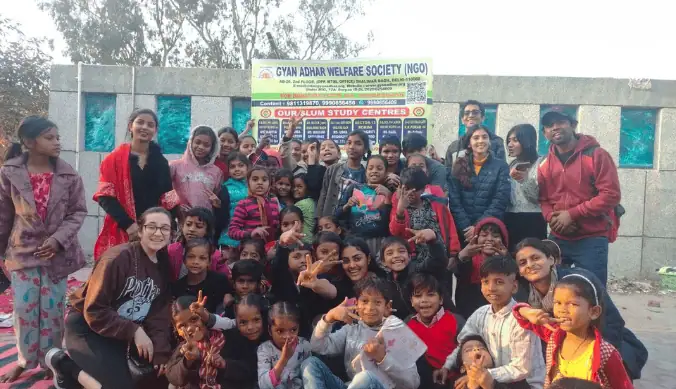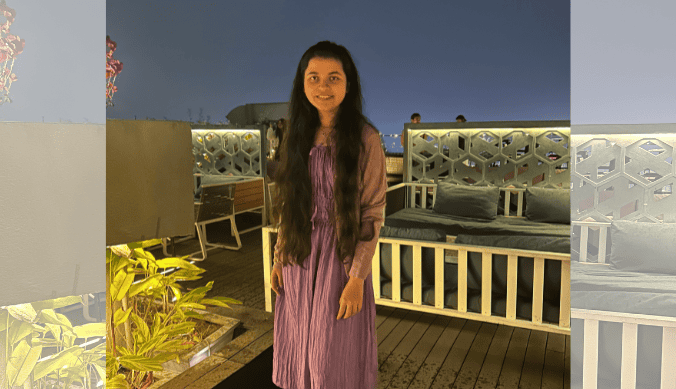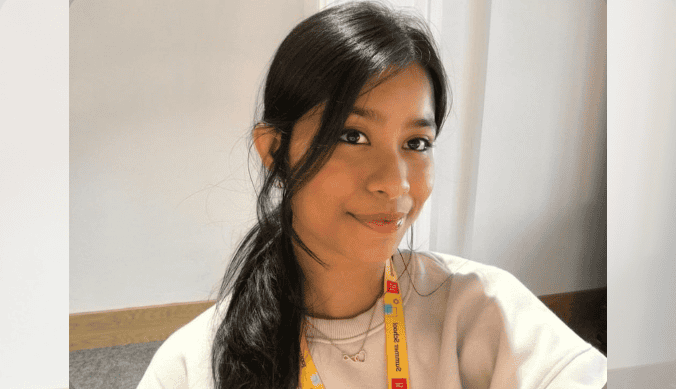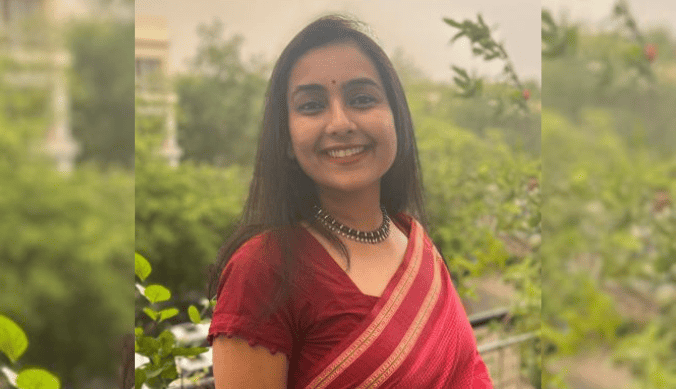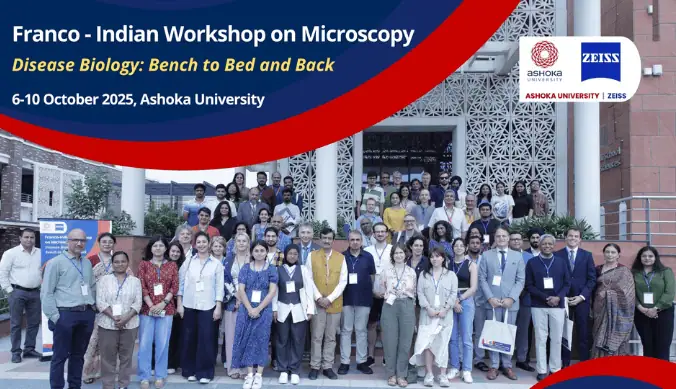Walking the Talk: A First Gen Learner’s Journey Rooted in Education and Equity
Ansuiya (YIF ’25) speaks at the BBC Action Media's Needle 2025 and the UNICEF YuWaah Youth Conclave
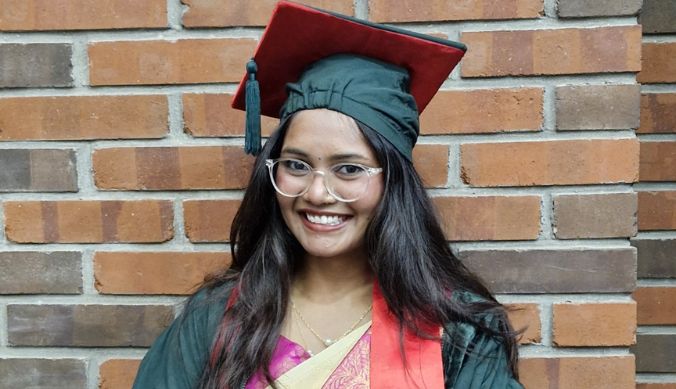
Ansuiya is a first-generation learner from Bundelkhand who has risen against the odds to carve a path of her own. Growing up in a region where girl’s education is often dismissed, she has challenged deep-rooted societal and structural barriers with quiet determination and remarkable grit. After spending seven years in a residential school and emerging as a CBSE national topper, Ansuiya went on to study at Lady Shri Ram College for Women and later joined the Young India Fellowship as a Chancellor’s Merit Scholar, becoming the only girl from her region to reach such academic spaces.
Her journey has shaped not only her perspective but also her purpose. Through her research, she explores why families in Bundelkhand hesitate to invest in education and how the glorification of girls who “make it” as exceptions can sometimes mask the hard work and systemic changes still needed. Ansuiya’s work and voice have taken her to national platforms. She was invited to speak at Needle 2025, BBC Action Media’s annual conclave held at Travancore Palace, where she shared a panel with filmmaker Arati Kadav to discuss the influence of women characters in cinema on youth and gender narratives. She also represented Youth ke Bol as a Policy Champion at UNICEF’s YuWaah Youth Conclave, where she spoke about improving the quality of life for adolescents particularly focusing on health, hygiene, and empowerment for girls and young women.
Ansuiya continues to question, challenge, and reimagine what’s possible not just for herself, but for countless girls like her. We recently spoke to her about her journey, YIF experience and future aspirations here is what she has to share:
Can you tell us a bit about your background?
I was born at a construction site in Sonipat, Haryana, to a family of migrant workers from Bundelkhand. I was one among the eight siblings, and like my sisters before me, my path seemed already chosen. I was expected to help my parents earn a living, save for my marriage, and eventually be married off, often before the legal age to someone with just a little more land than us.
But life had other plans. Due to some unexpected circumstances, my parents had to leave me in our village. That’s where I was admitted to the local primary school. I was the first girl in my family to ever step inside a classroom. It felt small at the time, but that moment quietly changed the course of my life. My headmaster, a Navodayan himself, saw something in me. He encouraged me to push my limits. His belief in me opened the doors to Vidyagyan School in Bulandshahr, a residential school for meritorious students from underprivileged backgrounds. I studied there for seven years. Slowly, my fate began to change. I graduated as a CBSE National Topper, received the KARM Fellowship and gained admission to Lady Shri Ram College for Women.
For my parents, who still don’t know how to sign their names, these milestones are beyond their understanding. But they’ve seen their daughter do something different. And that alone sparked change in them too, they became more open, more supportive, and more hopeful. It wasn’t just my journey that shifted, it was the beginning of change in the way our family saw what was possible.
What inspired you to start GirlUp Rubaroo, and how has the journey shaped your work in gender advocacy?
I come from a village where women are denied education and are expected to live their lives working under men and for men. Over time, they lose their sense of self, all in the name of sacrifice. Growing up, I often saw the men in the family, especially my father controlling all the financial decisions. Nights were filled with shouting, and sometimes even violence after drinking. It always made me extremely uncomfortable, and I constantly looked for ways to escape it.
When I came to college, I realised that just getting here wasn’t enough. Real change wouldn’t come unless women truly started to see themselves as worthy, as people who deserve to be celebrated, to be heard, and to feel safe. I understood how important it is to have a space where women can grow, support each other, and simply be themselves.
That’s what inspired me to start GirlUp Rubaroo. It became a platform where we could come together, share resources, learn, and talk about the things that matter to us. We organised workshops, collaborated with other organisations, and stood up for the causes close to our hearts. Rubaroo was a space for reflection, strength, and solidarity.
Could you tell us about your project ‘Shiksha se Saksham’ and internship at Breakthrough, where you’ve worked closely on education and empowerment?
My project ‘Shiksha se Saksham’ was part of the Millennium Fellowship, in collaboration with the NGO Hum Honge Kamyab, which works in the slum areas of Delhi Cantt. This project was very close to my heart. Coming from a rural background, I was familiar with the realities of education, gender discrimination, and domestic violence. But through this experience, I realised that these issues are just as present in urban spaces too. We started from scratch teaching children about gender equality, climate change, the importance of education, and much more. It was all about creating awareness and encouraging young minds to think differently.
At Breakthrough, I worked with the program team, where I had to document stories based on raw data from the field. I used to travel across villages in Haryana, meeting and interviewing beneficiaries. Most of them were women and young change leaders. Their stories moved me. Their courage, their resilience resonated with my own journey. I saw how real change is being made on the ground. I was inspired by the impact the team had created, and it gave me hope to see how girls are slowly but strongly challenging and reshaping social norms. These experiences taught me that real change takes time, but it begins with empathy, listening, and standing by those who are often unheard.
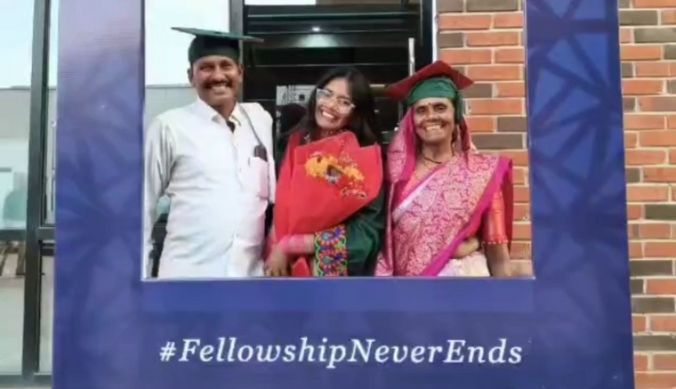
Your takeaways from the YIF both personally and professionally?
When I came to YIF, I came in with a lot of hope and excitement. I had waited for this opportunity throughout my undergraduate years. Everything I had heard about YIF, especially the sense of community at Ashoka made me want to be a part of it as soon as possible.
YIF was the first time I stepped into a space without the comfort of familiar faces. No childhood friends, no known people. Just me, learning to live, connect, and grow with strangers was my first big step. Slowly, I built relationships, some sweet, some bitter but all of them taught me something. I learned how to value the ones who truly matter. The bonds I formed here have transformed me, and I will carry them with me always. Back home, I never imagined I would call an elder by their name. But at YIF, I learned that respect goes beyond age or titles. In a society where hierarchy often dictates interaction, I had never approached someone in authority just for a conversation. But here, office hours with faculty helped me break that barrier, something that had long held me back.
YIF also taught me to speak up and stand firm. Being on a scholarship, I often felt I had to be submissive to prove I was grateful. But here, I learned there’s a difference between being grateful and being lesser. I worked hard to be here. I deserved to be here. Professionally, I am proud of what this year brought me. I came with the hope of finding a job. I never imagined I’d land a role at a global consulting firm like Genpact that I hadn’t even dared to expect.
I’ve always wanted to strengthen my writing, and YIF gave me that space. The Critical Writing course helped me discover my voice. I never thought I’d be able to write about my lived experiences with such clarity, but with Ananya’s guidance, I pushed myself and it’s possible. YIF also opened doors to subjects I never thought I’d study, be it physics, psychology, statistics or economics. Some of these became my favourite classes. And I never imagined I’d get to interact with such renowned faculty from around the world, but I did.
This year was more than academic or professional growth, it was extremely personal. I fought, I questioned, I cried, but I never gave up. Amidst family emergencies, health issues, and emotional ups and downs, I survived and more than that, I grew. YIF gave me more than what I asked for.
Tell us about your experience representing Youth Ki Bol, ‘Apni Rah, Apni Pehchaan’ Youth Conclave and BBC Media Action’s Needle 2025?
Youth ke Bol is a youth-led Indian coalition that brings together organisations like Dasra, The YP Foundation, Restless Development, and many others, with the vision of engaging one million young people to improve access to sexual and reproductive health. I’ve been a Youth ke Bol Policy Champion for the past two years. In this role, I’ve had the opportunity to participate in discussions and deliberations where young minds come together to draft policies for their own welfare. Through workshops, capacity-building sessions, and one-on-one mentorship with experts from our fields of interest, we’ve not only grown as individuals but also contributed meaningfully. We’ve conducted our own workshops, co-created youth-friendly resources, and helped organisations develop materials that speak to young people. At Apni Rah, Apni Pehchaan, UNICEF’s YuWaah Youth Conclave I spoke about how Youth ke Bol helped me find my voice and carve my own path. It’s been a journey rooted in faith, belief, and the power of being heard.
I was also invited as a youth speaker at Needle 2025, a communications conclave hosted by BBC Action Media, BBC’s independent international development charity. The conclave marked the organisation’s 25th anniversary and explored the intersection of feminism and climate change. I was part of a panel alongside filmmaker Arati Kadav, director of the film Mrs., where we discussed the role of cinema in shaping young minds and feminist thought. We explored how strong female characters in films challenge traditional gender norms and influence how society perceives women. The conversation revolved around education, awareness, and the evolving narratives that help build a more inclusive and equitable world.
What’s one cause or idea you’re walking out of the YIF more passionate about than when you entered and why?
When I came to YIF, I knew I wanted to work in the development sector. But over the course of this year, that passion became more focused. I realised that what I truly care about is education, especially at the policy level, and particularly in my own region. YIF gave me the space to explore and reflect deeply. Through the projects I worked on, especially those rooted in education, I started to see how central it is to everything I want to change in Bundelkhand.
Writing my research paper titled “Roots and Resistance: A Personal Reflection on Women’s Education in Bundelkhand,” which I presented at the 2nd YIF Critical Writing Conference, helped me look closely at the lived realities of women from my region. That process was personal and eye-opening. Similarly, working on a project about migration from Bundelkhand during the “Design Thinking” course, and writing essays in “Women, Society, and Changing India,” gave me the tools to see that the problems I’ve witnessed growing up, poverty, early marriage, lack of opportunity are all profoundly tied to gaps in education. These experiences didn’t just further my understanding, they made the issue feel even more urgent.
I now see education not just as a cause, but as the root of all meaningful change. Every conversation about progress in Bundelkhand whether it’s about gender, migration, or livelihoods comes back to one thing, access to quality education. That’s the purpose I’m carrying with me as I leave YIF. It’s something I’ll keep working on, particularly at the policy level, once I’ve taken care of my responsibilities. Because I know that real change begins in classrooms and I want to be part of building those.
Your advice for young girls who aspire to create change?
YIF is the place to understand oneself, to fight with, fall for, and then again stand for oneself. Coming here, I found myself and have understood myself. YIF isn’t just about big ideas, it’s about finding who you are. I came here with hope, and through moments of doubt, joy, struggle, and reflection, I found clarity. I realised that to change the system, you must first know your place in it. And I believe, until you know yourself well, all the causes will be left just like that. So come to YIF with your whole self. Be ready to feel deeply, laugh, cry, question, and grow. It will challenge you, but it will also shape you. You’ll leave not just with direction, but with the strength to stand your ground and lead with purpose.
———————————————————————————————–
Ansuiya, a first-generation learner from Bundelkhand and Chancellor’s Merit Scholar (YIF 2025), researches why families in her region underinvest in education. She also explores how girls defying norms are glorified as exceptions, overshadowing their hard work and reinforcing systemic barriers to change. Ansuiya is a Lead Consultant AI at Genpact.
(Written and edited by Shahambare T, Young India Fellowship)
Study at Ashoka








